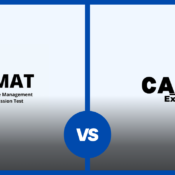
The Dual Nature of AI Tools in MBA Admissions
In recent years, the integration of artificial intelligence (AI) tools into MBA admissions processes has brought about both opportunities and challenges. While these tools hold the promise of enhancing efficiency, reducing bias, and providing personalised support, they also raise concerns about algorithmic fairness, contextual understanding, over reliance on metrics, and privacy issues. This essay explores the dual nature of AI tools in MBA admissions, highlighting their potential benefits and pitfalls, and emphasises the importance of responsible implementation to ensure fairness, transparency, and respect for applicants’ privacy and individuality. Let’s dive deep into this article to know more and better about both the helpful and harmful aspects of AI TOOLS.
Helpful Aspects:
Efficiency:
AI tools have the capacity to streamline the MBA application process, benefiting both applicants and admissions committees. By automating routine tasks such as document verification and data entry, AI can significantly reduce the time and resources required for application processing. This efficiency allows admissions committees to focus more on substantive aspects of the applications, such as evaluating essays and conducting interviews, ultimately leading to a smoother and more streamlined admissions process.
Data Analysis:
The ability of AI to analyse large volumes of application data enables admissions committees to gain valuable insights into applicant pools. By identifying patterns and trends that may not be immediately apparent to human reviewers, AI enhances the decision-making process. For example, AI algorithms can flag discrepancies or inconsistencies in application materials, helping admissions committees conduct more thorough reviews and make informed decisions.
Bias Reduction:
One of the most promising aspects of AI in MBA admissions is its potential to reduce unconscious bias. By standardizing the evaluation process and focusing solely on relevant criteria, AI tools can help mitigate the influence of subjective factors that may inadvertently affect admissions decisions. This standardized approach promotes fairness and equity, ensuring that all applicants are evaluated based on their merits rather than irrelevant demographic characteristics
Personalisation:
AI-powered tools can offer personalized support and guidance to individual applicants throughout the admissions process. By analysing applicant data and preferences, AI systems can tailor communications and support resources to meet the unique needs of each applicant. This personalised approach not only enhances the applicant experience but also increases engagement and improves the likelihood of successful outcomes.
Harmful Aspects:
Algorithmic Bias:
Despite their potential benefits, AI algorithms are susceptible to biases present in the data they are trained on. If not properly designed and monitored, these algorithms can perpetuate or even amplify existing biases, leading to unfair treatment of certain groups of applicants. For example, if historical data used to train AI models reflects systemic biases, such as gender or racial disparities, the resulting algorithms may replicate these biases in admissions decisions, perpetuating inequality rather than promoting diversity and inclusion.
Lack of Contextual Understanding:
AI tools may struggle to fully understand the nuanced qualities and experiences of MBA applicants. While algorithms excel at analysing quantitative metrics, such as test scores and GPAs, they may overlook qualitative aspects, such as leadership potential, creativity, or interpersonal skills, which are often crucial for MBA admissions. This lack of contextual understanding can result in a narrow and incomplete assessment of applicants’ overall suitability for MBA programs, potentially overlooking valuable contributions they could bring to the cohort.
Over-reliance on Metrics:
Another potential pitfall of AI in MBA admissions is the tendency to over-rely on quantitative metrics at the expense of qualitative factors. While AI algorithms excel at processing numerical data, they may struggle to assess subjective qualities that are essential for evaluating MBA applicants. Attributes such as leadership potential, communication skills, and adaptability are difficult to quantify and may be undervalued or overlooked in AI-driven admissions processes, leading to a homogeneous cohort lacking in diversity and innovation.
Privacy Concerns:
The use of AI tools in MBA admissions raises significant privacy concerns, particularly regarding the collection and handling of sensitive applicant data. If not adequately protected, applicant data may be vulnerable to breaches or misuse, compromising the integrity and confidentiality of the admissions process. Additionally, applicants may have concerns about the transparency of AI-driven decision-making and the extent to which their personal information is being used to assess their candidacy. Addressing these privacy concerns is essential to maintain trust and confidence in AI-powered admissions processes.
In conclusion, AI tools have the potential to revolutionize MBA admissions processes by enhancing efficiency, reducing bias, and providing personalized support. However, realising these benefits requires careful consideration of the ethical implications associated with their use. By addressing concerns such as algorithmic bias, lack of contextual understanding, over-reliance on metrics, and privacy issues, institutions can harness the power of AI to improve admissions outcomes while ensuring fairness, transparency, and respect for applicants’ privacy and individuality. Ultimately, responsible implementation and ongoing monitoring are essential to maximise the potential of AI tools in MBA admissions while minimising their potential harms.



